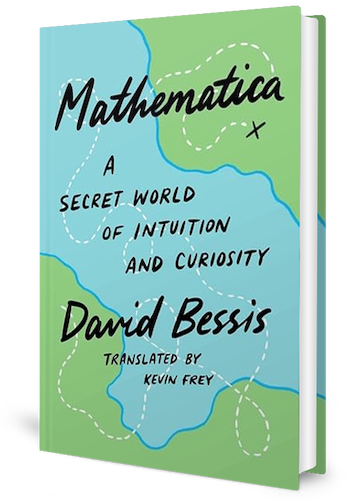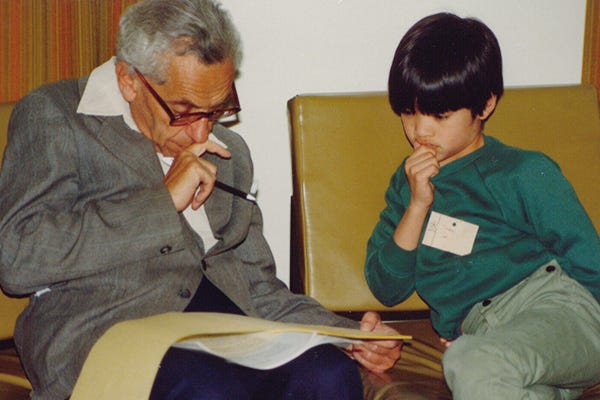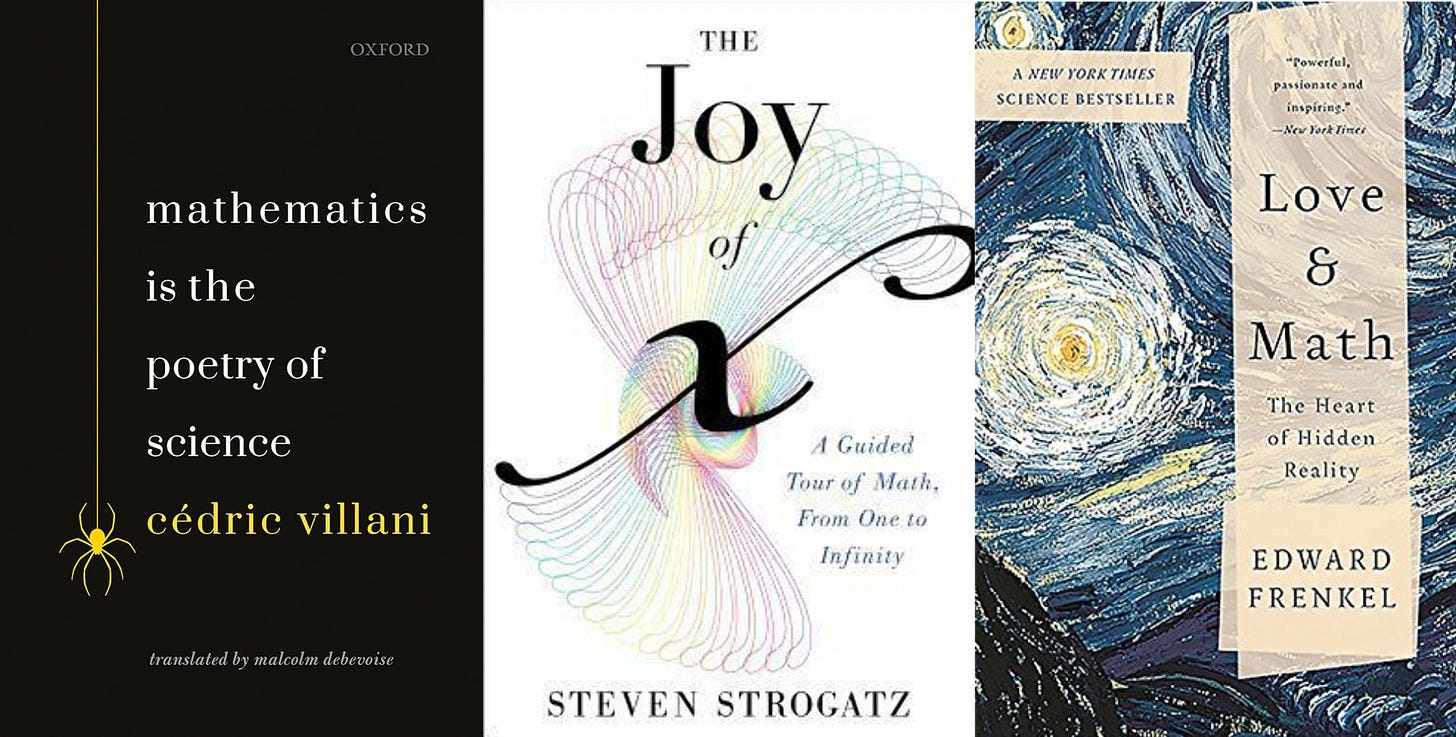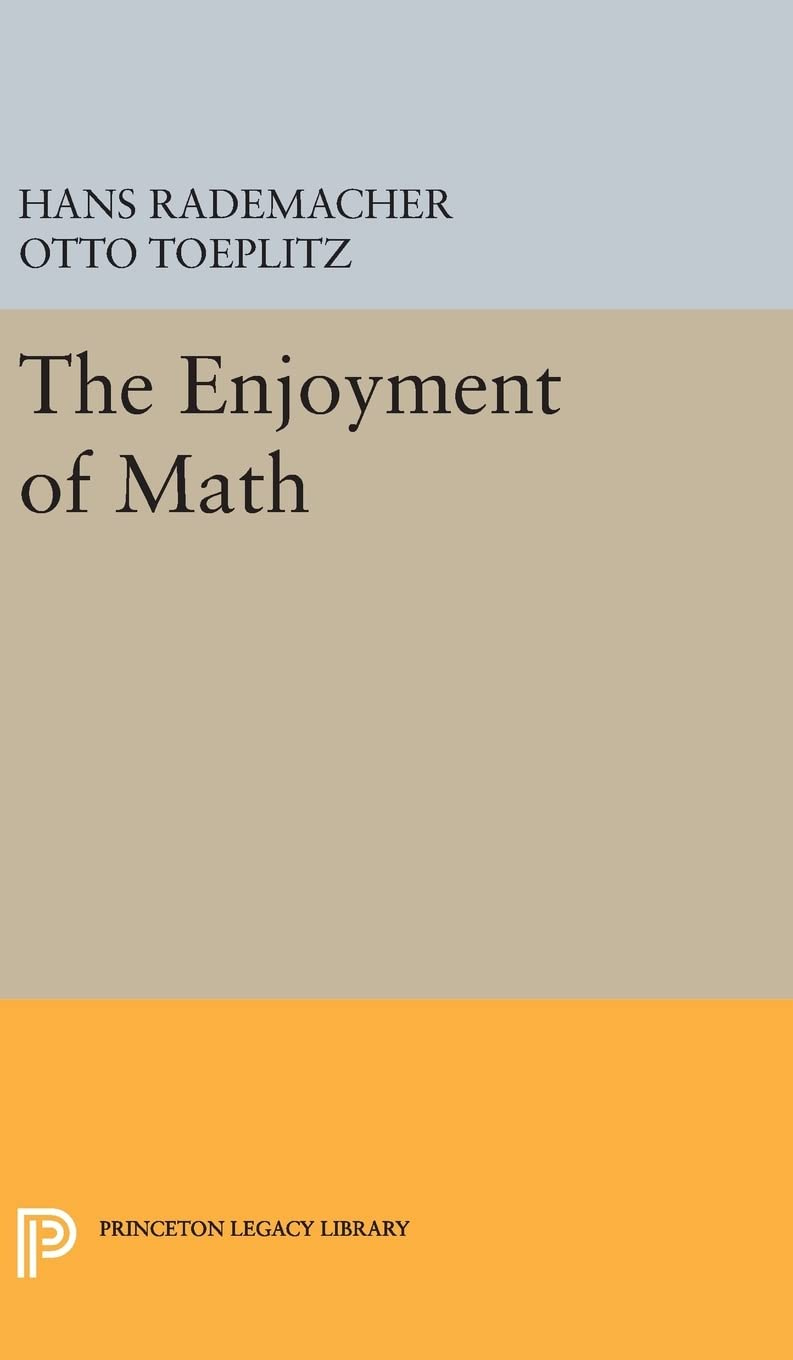"I am struggling to think who would want to read this book"
The reader report that could have killed my book, and proved it right
Dear David,
Hello again!
We have now received three reader reports for the English language edition of Mathematica/Secret Math. I am attaching all three for your consideration.
The first report is what I would characterize as ambivalent/not very helpful. I think that reader wants a different kind of book and does not consider himself a target reader for it. The second and third reports are supportive, and the two readers “get” what your goals are for the book.
I opened this email from my editor, Jean, and my heart sank. Something was wrong but I couldn’t tell what.
A report that was “ambivalent/not very helpful”? What could it possibly mean?
I jumped to the attachments and found the first reader report. It took me about 10 seconds to scan through it. The report wasn’t “ambivalent/not very helpful”. It was nuclear.
The worst part was this horrible passage in the concluding paragraph:
I am struggling to think who would want to read this book […] Should Yale University Press publish this? That’s a tough call for me.
In reader report parlance, the passage is far less ambivalent than it purports to be. It functions as a “kiss of death” that annihilates all prior positive words from the reviewer.
It’s like a reference call at the end of a hiring process, where a former employer would say something like this: “David has many qualities and there are many reasons to like him. But I’m struggling to think who would want to work with him. Should you hire him? That’s a tough call for me.”
Long story short, we overcame this stressful moment. Jean was persistent enough and luck was on our side. Had one of the other two reports been slightly less enthusiastic, it would have been a completely different scenario.
The book ended up being published and Yale University Press found out that there are quite a number of people who “want to read it”.
However, I’ve continued to think a lot about this report, which correctly anticipated the central themes of the online debate around my book.
This negative report is the perfect entry point to this Substack and to the themes that I will be discussing in the coming months.
I have no idea who this reviewer might be—Jean’s email only leaks that he’s a “he”—and I am not interested in finding out. I hold no grudge. Reader X, as I'll call this anonymous mathematician, was obviously sincere in his assessment. What’s most interesting is that he liked and disliked:
The central theme of this book is one with which I half-heartedly agree.
The agree part is this: The formal language in which mathematics is written is essential, but it obscures how mathematicians create their art.
Where I disagree with the author is his rejection of the role of innate talent. When I was younger I could play the piano, but I was no musician. I certainly practiced.
It’s a pity that the author takes an (my opinion) extreme view against any notion of innate ability.
It’s a pity because it dilutes the important message of this book: There are ways to think about mathematics based on intuition and those ways can (should!) be nurtured as part of mathematics education.
Reader X thinks that my criticism of hereditarian myths is a useless distraction from the valuable part of my project. I think the exact opposite: that his unscientific views on the origin of mathematical talent prevent him from seeing the bigger picture and understanding my core message about mathematics itself.
Yet Reader X is factually correct on one thing: the heritability debate is indeed a distraction from the important debate on the nature of mathematics.
I just think that this is unavoidable. The math genius myth is an essential component of our millennial misconceptions on mathematics and human cognition, and a major obstacle to their resolution.
This is why I chose to confront the problem head on and open my book with this famous Einstein quote:
I have no special talent. I am only passionately curious.
The quote serves as a leitmotif throughout the book, alongside strikingly similar quotes by René Descartes and Alexander Grothendieck. We collectively refuse to take these great geniuses seriously when they deny that their talent is innate, and this attitude has a major side-effect: we also refuse to learn from them.
A joke in bad taste
When Einstein talks about curiosity, he’s not picking a random word. He's not trying to be polite, or modest, or politically correct. He is simply attempting to articulate his unusual mental posture, a cognitive attitude that is extremely difficult to convey with words, but is nevertheless learnable and, to a certain extent, coachable—if only we care to listen.
Reader X thinks he knows better than Albert Einstein. He offers this counterargument:
My “counterexample” to this talent-doesn’t-matter assertion is Terry Tao; I offer this photograph of a ten-year-old Tao discussing mathematics with Paul Erdős. In my opinion, Tao is an innate mathematical genius. What other ten-year-old could pal around doing mathematics with Uncle Pál?
There is a double irony here. First, Terry Tao has publicly stated that he doesn’t believe that mathematical talent is a matter of genes:
Are there people who are naturally good at math and others who are hopelessly bad at math? I don’t think so. I think everyone has an innate mathematical talent.
Second, Terry ended up blurbing my book, which makes him a less-than-ideal counterexample to my ideas.
But Reader X was remarkably prescient in the sense that similar objections popped up in dozens of online conversations around the book. My interview with Quanta Magazine sparked an absurd shouting match on Hacker News with hundreds of comments focused on one single aspect of the interview: my claim that mathematics does not require an innate gift.
On Twitter/X, the most creative insults have been thrown at me. I’ve been called a “midtard,” an “insane flat-earther,” a “half commercial person half prophet selling his gene pool experience as a standard worldview.”
I was expecting such reactions, but I wasn’t expecting them to be so common and emotionally loaded. Some people apparently feel personally insulted by the very notion that mathematical genius isn’t innate.
Ironically again, this was anticipated by Alexander Grothendieck in his mathematical autobiography Harvests and Sowings, in a passage that was actually quoted in my book:
When you dare say such things, you see on everyone’s face, from the dullest who are sure they’re dull, to the smartest who are certain they’re smart and well above common mortals, the same smiles, part embarrassed, part knowing, as if someone had made a joke in bad taste.
A common pattern in the backlash is the notion that career mathematicians who challenge hereditarian myths must be either delusional or indoctrinated.
For some reason, people imagine that we’ve spent our entire lives in the ivory tower. We weren’t born in “normal families”, we never went to “normal schools”, we never met “normal people”, and we never had to teach kids who were struggling with math.
They also assume that we are ignorant of the entire IQ heritability debate, and that we bluster out utter nonsense for the mere pleasure of being insulted on the internet.
I can’t speak for Terry Tao, but I would never venture into such contentious territory without serious evidence up my sleeve.
Returning to Reader X’s “counterexample”, here are a few comments:
First, I never denied the existence of a massive talent gap in mathematics. This is in fact the starting point of my book, as illustrated by this excerpt from Chapter 1:
A striking aspect of mathematics is the regular occurrence of incredibly talented individuals who appear out of nowhere and, from a young age, demonstrate abilities vastly superior to that of their peers. At the other end of the spectrum, many people struggle with high school math or even primary school math. In the absence of a better explanation, it is natural enough to attribute this extreme level of inequality to “innate” talent.
Second, I am not denying that this gap is partly attributable to genetics. Again from Chapter 1 of my book:
There’s no doubt that natural aptitude in math, like natural aptitude in any other physical activity, isn’t equally distributed among individuals.
What I am disputing is the supposedly genetic origin of mathematical talent, this mysterious ability that some kids do possess in spectacular amounts while many otherwise intelligent kids seem to be entirely lacking.
It’s not because extreme mathematical talent manifests itself from an early age that it is necessarily innate. I understand why one might be tempted to make that jump. But this indeed is a jump and, in my opinion, an invalid one.
The nuance between “precocious + unexplained” and “innate” is subtle yet essential. The culprit is our traditional Nature vs Nurture framework, which makes us presume that whatever cannot be explained by social determinism must necessarily be explained by genetic determinism.
This preconception is invalid, as captured by Turkheimer’s Third Law: “A substantial portion of the variation in complex human behavioral traits is not accounted for by the effects of genes or families.”
In this earlier post, I discussed the example of Bill Thurston, a true mathematical “genius” with precocious and seemingly “superhuman” capabilities for which there is well-documented explanation that isn’t genetic.
In fact, the existence of spectacular geniuses like Terry Tao and Bill Thurston is a strong argument AGAINST hereditarianism. Indeed, as argued in the first chapter in my book, the math talent gap is too extreme for genetics to be the primary driver:
Human beings do exhibit innate biological differences, but overall we are a fairly homogeneous species. People differ in height, muscular strength, cardiac output, and lung capacity, and part of this variability can be traced to genetic factors. Yet those differences never encompass multiple orders of magnitude.
To use a metaphor that we’ll develop in the next chapter, math is so unequal that it’s as if some people could run the one-hundred-meter dash in under a second, while the majority wouldn’t make it in a week. While it’s conceivable that some people may genetically be endowed with a neuronal metabolism that is more efficient and powerful, making them, let’s say, twice as capable in math, or why not ten times as capable in math, it’s hard to believe that genes alone could explain such an absurd level of inequality.
Indeed, highly-heritable polygenic traits like height follow a Gaussian distribution of outcomes, where people cluster around the mean, while mathematical talent resembles more a Pareto distribution. In layman’s terms, here is how to think about this argument:
Despite persistent rumours of the contrary, almost all human beings measure the same exact height, 170cm, plus or minus 30%. Size does matter, but not to the point where different people have to use different doors, different stairs, different cars and different chairs.
If mathematical talent resembled anything like this, no-one would be talking about it, and you wouldn’t have continued reading this post.
This isn’t a trivial point, but a statistical smoking gun. The stunningly uneven distribution of mathematical talent bears the unmistakable signature of a non-deterministic cumulative process, where one capitalizes on past successes and the initial genetic signal gets diluted in an ocean of noise.
This argument triggered thousands of objections on social media: What about IQ? What about twin studies? What about adoption studies? Are you making a heuristic argument or a rigorous proof? Are you a radical leftist, a wokester, a blank-slatist?
If you’re asking yourself the same questions, please make sure that you’re subscribed to this Substack, as I’ll address them in future posts.
But, as Reader X rightfully pointed out, the heritability debate can become a distraction from the more important issue on the table: our profound misconceptions on the nature of mathematics.
An attempt to change the world
Despite his reservations, Reader X concedes that my book contains valuable insights on how mathematics should be presented to students and the general public:
There are ways to think about mathematics based on intuition and those ways can (should!) be nurtured as part of mathematics education.
Many of the ideas [presented in this book] should be read by K-12 and college mathematics instructors.
The repeated use of “should” is a striking indicator of cognitive dissonance:
Reader X agrees that math is presented in a dysfunctional way,
he agrees that “K-12 and college mathematics instructors” would benefit from reading my book,
yet he assumes that no-one will want to read it.
This cognitive dissonance is a pretty common symptom among career mathematicians. It leads to a fatalist worldview where mathematicians feel perpetually misunderstood. They complain that mathematics is unfairly ridiculed as a sterile, anal retentive discipline—and they see no way out.
Alas, if only the public knew that math is ultimately about intuition and creativity! If only they could see its beauty! If only they could experience the rapturous joy of feeling math!
We mathematicians love to lament about the state of mathematical education, yet we’re also good at dodging the tough question: what if we were ultimately responsible for the disaster?
This is where hereditarian myths come back into the picture: they provide us with the perfect excuse. If “normal people” are genetically incapable of understanding math, what can we do about it?
I spent my entire mathematical career stuck in this dissonance and found it deeply depressing. I decided in my late 20s, when I was an assistant professor at Yale, that I wanted to do something about it.
I became obsessed with the idea of writing a popular book about math. I tried every year or so, and systematically failed. I was always giving up after a page or two. There was a profound mismatch between what I wanted to write, and what I was capable of writing.
Most popular math authors are driven by the same frustration. Quite often, they’re successful mathematicians who are fed up with the atrocious public image of math, and look for ways to repair the injustice. Beyond the actual mathematical content of their books, they’re also trying to share their inner experience of math, in an attempt to change the world.
Just look at these titles: “poetry”, “joy”, “love”—these are attempts to reposition math itself.
But here’s the problem. A century ago, Henri Poincaré wrote fabulous books on mathematical intuition. G.H. Hardy wrote his famous Mathematicians’s Apology. There’s even a 1930 book called The Enjoyment of Math, by Rademacher and Töplitz.
And none of this changed anything.
If all these great mathematicians failed to resolve the dissonance, then one needs to try an entirely different approach.
My opening came when I taught an introductory course on mathematics to humanities students at the École normale supérieure in Paris. It was a free form course, with no preset curriculum and an audience mostly consisting of philosophy students eager to learn about foundational aspects.
I knew a bit about these topics from my student years, but having to teach them in front of a class placed them in an entirely different perspective.
This was a deeply unsettling experience. The foundational myths of mathematics, which I had accepted when they were presented to me in my 20s, stopped making any sense at all. The philosophical debate around Platonism, formalism, and intuitionism appeared entirely artificial and meaningless.
I had never heard of Reuben Hersh and wasn’t aware that, back in the 1970s, he had faced the same exact issue in the same exact context, finding himself in the awkward position of having to teach the “foundations” of mathematics and coming to the conclusion that the standard material made no sense at all:
Here I’m teaching this course to these poor students and I get halfway or more through it and I tell them: “That’s it. We mathematicians failed. All of us.”
And now what? That’s terrible! I was really embarrassed… You don’t want to appear before innocent hopeful students and tell them that’s all you can say. No, they want more, they’re entitled to more…
“Russell said this, Hilbert said that, Brouwer said this other thing, and they were all mistaken.”
What kind of answer is that? It’s really pathetic. I’ve been worrying about it ever since.
This moment came at a turning point in my career. I was in my early 30s and had just proved a substantial conjecture in my domain, which boosted my mathematical self-confidence. Had I taught this course a few years earlier, I would probably have concluded that I was the one not getting it right.
Mathematica has its roots in my personal notes for this experimental course. Back then, I knew what was broken, but I wasn’t yet capable of fixing it.
My ideas continued to mature for another 15 years, yet the fundamental intuition traces back to this primal ahah moment: what is to me the most important aspect of mathematics, what makes it so unique and enjoyable and what enabled me to become a successful mathematician, is something that no-one ever told me about, and that I stumbled upon entirely by chance.
The project crystallized in the summer of 2020, when I made an accidental discovery. As I was re-reading Descartes in parallel with Grothendieck’s Harvests and Sowings and Thurston’s famous essay On Proof and Progress in Mathematics, it struck me that the three of them, coming from entirely different backgrounds, were basically telling the same exact story—a story that was resonating with mine. Each one of them, with his own language and idiosyncrasies, was trying to articulate the peculiar cognitive attitude that is unique to mathematics, a special way to playing with one’s imagination.
While high-brow philosophy has never managed to produce a compelling account of the true nature of mathematics, there has been a remarkably consistent consensus among mathematicians as to what it means to do math, what it feels like and how one gets better at it.
A good way of framing this is by distinguishing “official math” from “secret math”:
“Official math” is the aspect of mathematics that is traditionally taught in school: the rigid definitions, the logical reasonings, the abstract symbols on the page. It has all the attribute math is famous for: it is cold, objective, rigorous, obscure.
“Secret math” is about the unseen actions that one performs in one’s head, the mental images through which one attempts to make sense of the abstract symbols. “Secret math” was never part of the curriculum, because it wasn’t taken seriously. It lacks all the attributes that one expects from math: it is naive, fuzzy, subjective, hard to articulate and hard to replicate.
Yet career mathematicians know that “secret math” is where the real action takes place. In private, they freely discuss their intuitions, explain how they “see” things, admit what puzzles them and their naive attempts at making sense of the many things that they don’t yet understand.
“Secret math” is a martial art that relies on “official math” as equipment. Logic and formalism aren’t tools for thinking, but tools for finding out where we’re thinking wrong and gradually honing our intuitions.
This is where the two threads merge together: the hereditarian myths around mathematical talent take their roots in our profound and ancient misconceptions on the nature of mathematics.
Once you realize that mathematicians rely on mental techniques that are never even mentioned at school, it’s no longer surprising that math is uniquely hard to teach. But if you are firmly convinced, like Reader X, that mathematics requires a special innate talent, then any discussion of the inner experience of making sense of math will seem like a complete waste of time.
In his Rules for the direction of the Mind, Descartes has this crazy conspiracy theory that ancient Greek philosopher-mathematicians chose to conceal the “true” mathematics in an attempt to protect their prestige. If the secret of mathematics was disclosed to the general public, it would become readily apparent that mathematicians aren’t really that special:
I have come to think that these writers themselves, with a kind of pernicious cunning, later suppressed this mathematics as, notoriously, many inventors are known to have done where their own discoveries were concerned. They may have feared that their method, just because it was so easy and simple, would be depreciated if it were divulged; so to gain our admiration, they may have shown us, as the fruits of their method, some barren truths proved by clever arguments, instead of teaching us the method itself, which might have dispelled our admiration.
Mathematica1 is my attempt to document these secrets and “leak” them to the public. It is based on the accounts of Descartes, Grothendieck and Thurston, and also on my own experience as a mathematician.
From pre-school to PhD programs, all students of mathematics confront the limits of their cognitive abilities. Career mathematicians confront theirs every day. No-one is born with an innate understanding of high-level abstractions, and no-one is immune to the fear of not being smart enough. But there are techniques to engage with mathematics in a more enjoyable and more effective manner.
Knowing that my book was venturing into several ideological minefields, I chose to remain practical and down-to-Earth. My goal wasn’t to win debates with hereditarians or specialists of the philosophy of the mind, but to deliver concrete value to casual readers. I know that the book leaves many questions unanswered and many stones unturned, and will use this Substack for objection-handling and material that couldn’t find its place in the print edition.
In two prior posts, this one and this other one, I discussed the conceptualist approach to the philosophy of mathematics which, in my view, is the proper way to account for the “official math” vs “secret math” tension. This other post opened a thread on the heritability debate that I’ll pursue in the future.
Of course, I will also pursue the exploration of “secret math”.
Jean’s email refers to the book as Mathematica/Secret Math, as back then we were still debating the English title. My preference was with Secret Math, but Yale University Press didn’t allow it, possibly because it sounded too conspiratorial and clickbaity. This is unfortunate, as it was indeed the most accurate title: it’s a book about mathematical cognition, a phenomenon that takes place in the secret of our head—it is invisible by nature and not through anyone’s fault. This invisibility is an essential aspect of math and a driver of the confusion that surrounds it.





For me, your blog posts cut deeper and provide a better explanation of your thesis than your (marvelous) book did. You get better at explaining your ideas over time. Perhaps you could do a blog post giving all the ways you know to develop math intuition. Having your ideas on that topic concentrated in one place rather than spread out through an entire book would be a huge benefit for many people. Instructors could then link to your post for students. A succinct blog post on this topic is likely to have a greater impact on students than an entire book they are less likely to read. My 2 cents ;-)
Wonderful.
I find myself reflecting on chess which has very similar debates about talent and process.
A key skill in chess is calculation. But I strongly suspect that the whole way it is discussed is wrong.